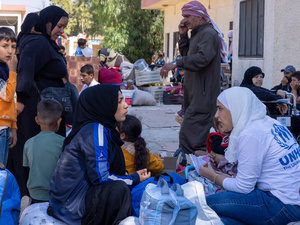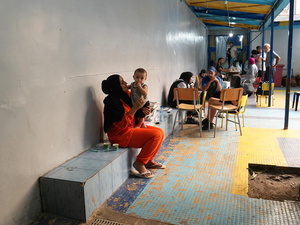Israel takes over review of local asylum claims from UNHCR
Israel takes over review of local asylum claims from UNHCR

Dadaab camp in Kenya, cited in the report by the U.N. Office of Internal Oversight Services.
JERUSALEM, Jan. 25 (UNHCR) - Israel has joined the growing list of countries to take over the responsibility of reviewing asylum claims from the United Nations High Commissioner for Refugees.
A new government committee created to handle the claims, known as National Status Granting Body (NSGB), met for the first time Tuesday following a two-year effort by UNHCR to involve Israel more deeply in reviewing asylum claims and granting refugee status.
UNHCR, however, will continue to prepare cases for submission to the Israeli officials this year, a task that will be eventually handed over to the government.
The refugee agency does not deal with Palestinian refugees in Israel and the surrounding states, a task handled by the U.N. Relief and Works Agency for Palestine Refugees in the Near East (UNRWA).
Many states, particularly developed countries, have long handled refugee status determination themselves, with U.N. refugee agency staff monitoring the process.
For decades, UNHCR itself handled asylum claims in Israel, although the state is among the original signatories to the 1951 Refugee Convention and its 1967 Protocol. The process has been criticised as being too lengthy, with asylum seekers interviewed locally but their cases examined at the agency's Geneva headquarters.
The system was particularly gruelling for the asylum seekers. Even if their claims were accepted by UNHCR, the Israeli government had to approve the agency's decision, further delaying the process.
UNHCR's honorary representative in Israel, Mickey Bavly, said Israelis understand the plight of refugees, since more than three million citizens of the country were themselves forced into exile.
"The Israeli people have a very personal understanding of what it means to be a refugee, you don't need a real effort to persuade them," Bavly said. "But what was needed was to persuade the Israeli government to take the action and not rely solely on the U.N. [to examine claims]."
Participants in the new governmental board include officials from the Justice, Interior and Foreign Affairs ministries. The body is presided over by a judge, Abraham Shafat, a former legal adviser to the state's Interior Minister and himself a former refugee and a survivor of Nazi Germany's concentration camps after being taken from his native Hungary during the Second World War.
In its first meeting Tuesday, the board considered 15 cases, accepting four claims for refugee status and rejecting 11 others. There are more than 300 asylum seekers in Israel today, mainly from Africa or Middle Eastern countries.
Israel must still approve national refugee legislation to codify the asylum process and ensure that asylum seekers and refugees are treated equally, regardless of their country of origin.






